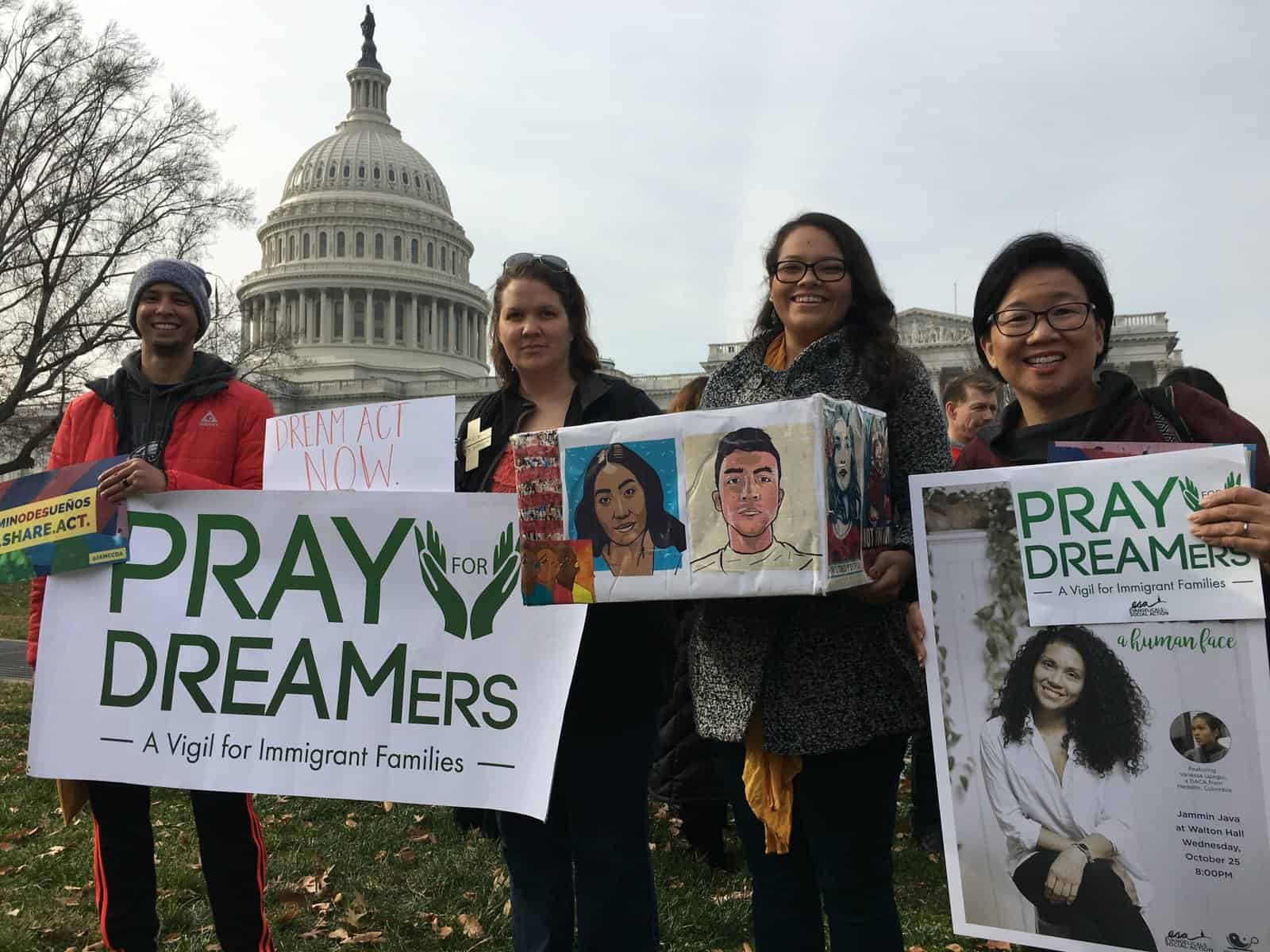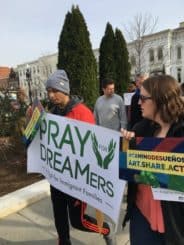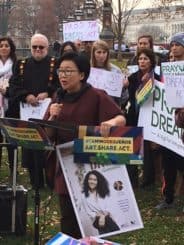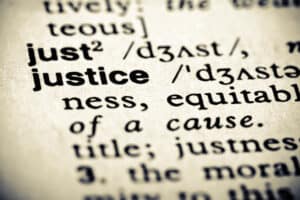 When rejection is the overwhelming context, being treated as a political ping-pong only aggravates the sentiment. Such is the day-to-day reality of DACA dreamers, who don’t need partisan debate as much as a group hug.
When rejection is the overwhelming context, being treated as a political ping-pong only aggravates the sentiment. Such is the day-to-day reality of DACA dreamers, who don’t need partisan debate as much as a group hug.
It was a personal honor to participate in a DACA social justice action in Washington this week. The event was sponsored by the Christian Community Development Association, and joined by Christians for Social Action, Matthew 25, Sojourners, Red Letter Christians, Bread for the World, and other socially concerned Christian organizations. There were people from California, North Carolina, Illinois, and Pennsylvania. Among the speakers were CSA’s own Nikki Toyama-Szeto, Shane Claiborne, Jim Wallis, Alexia Salvatierra, and Lisa Sharon Harper. This action was the culmination of the #PrayforDREAMers campaign, launched in October. The accumulated prayers, written on green 3X5 cards, were brought in decorated boxes to the Capitol.
 What made this action so meaningful was not its size or stirring rhetoric, but its commitment to prayer. When confronted with an intractable spiritual obstacle, Jesus reminded his disciples, “This kind can come out only by prayer” (Mark 9:29). In our modern secularized spirituality, we tend to discount or downplay the importance of prayer. Not so this event. For over an hour we shared in the heartache of the DACA community, and believed with God that perfect love casts out fear.
What made this action so meaningful was not its size or stirring rhetoric, but its commitment to prayer. When confronted with an intractable spiritual obstacle, Jesus reminded his disciples, “This kind can come out only by prayer” (Mark 9:29). In our modern secularized spirituality, we tend to discount or downplay the importance of prayer. Not so this event. For over an hour we shared in the heartache of the DACA community, and believed with God that perfect love casts out fear.
What made this action so meaningful was not its size or stirring rhetoric, but its commitment to prayer.
For some this was political, pleading for a clean legislation. For others it was spiritual, following Jesus’ teachings about aligning with the vulnerable. For most it was personal, tied to a particular name and face; many of whom were written on wooden crosses carried by the 75 or so protest participants.
 My own wooden cross bore the name “Vanessa.” Vanessa Upegui is a DACA dreamer originally from Medellín, Colombia, and last month she married my son, Alex. For me, the DACA debate went immediately from public policy to family advocacy. The ambiguity of identity, the chronic reminder of being unwanted, the fear of deportation, the sense of being incarcerated within this country, the crushing expense of legal immigration, and the daily hassle that makes human flourishing an afterthought: all of these feelings and frustrations became a part of our dinner conversations.
My own wooden cross bore the name “Vanessa.” Vanessa Upegui is a DACA dreamer originally from Medellín, Colombia, and last month she married my son, Alex. For me, the DACA debate went immediately from public policy to family advocacy. The ambiguity of identity, the chronic reminder of being unwanted, the fear of deportation, the sense of being incarcerated within this country, the crushing expense of legal immigration, and the daily hassle that makes human flourishing an afterthought: all of these feelings and frustrations became a part of our dinner conversations.
Shane Claiborne reminded us in the memorable words of Dr. Martin Luther King, “The church must be reminded that it is not the master or the servant of the state, but rather the conscience of the state.” The strongholds of state power were met with the humble prayers and palpable love of God’s children. When our vulnerable neighbors needed us, we were there. But far more important, God was there. And so we continue to pray for clean legislation to replace DACA. We care because God cares. It is in His embrace that we find our hope and true home.
John Seel is a consultant, writer, cultural analyst, and cultural renewal entrepreneur. He is the founder of John Seel Consulting LLC, a social impact consulting firm working with people and projects that foster human flourishing and the common good. The former director of cultural engagement at the John Templeton Foundation, he is a national expert on millennials and the New Copernicans. He has an M.Div. from Covenant Theological Seminary and a Ph.D. in American Studies from the University of Maryland (College Park). He and his wife, Kathryn, live in Lafayette Hill, PA. He directs the New Copernican Empowerment Dialogues at The Sider Center at Eastern University. This post originally appeared on his blog, New Copernican Conversations.


